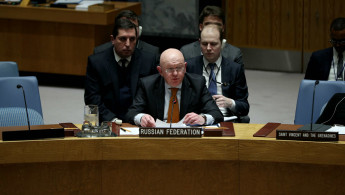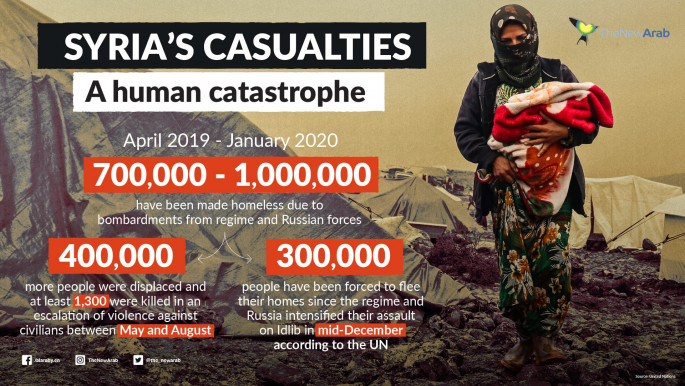Russia, China block UN chief's push for crucial Syria ceasefire
The appeal was welcomed by 13 of the 15 nations on the UN Security Council at an emergency meeting, though Syria's closest allies Russia and China blocked the move.
The UN chief made the appeal after air strikes in the last opposition stronghold in Idlib killed at least 33 Turkish troops on Thursday.
The attack heightened tensions between pro-opposition Turkey and Russia, and raised the possibility of an all-out war with millions of Syrian civilians trapped in the middle.
Guterres said he's been in very close contact with Russia and Turkey, appealing for a cease-fire in the Idlib region but "we are not yet there".
"Without urgent action," he warned, "the risk of even greater escalation grows by the hour".
The four European Union council members - France, Germany, Belgium and Estonia - said in a joint statement that "the military escalation in Idlib must stop".
"We demand an end to this Syrian military campaign supported by Russia, and fully back the calls made by the UN secretary-general for an immediate ceasefire and unimpeded humanitarian access," they said.
"We strongly urge the UN to accelerate and intensify their engagements with all relevant parties to secure an immediate cease-fire effort in northwest Syria."
The four EU countries requested the emergency meeting along with the United Kingdom, United States and Dominican Republic.
US Ambassador Kelly Craft condemned the attacks on the Turkish troops "in the strongest possible terms," calling them "wholly unjustified, senseless and barbaric." She reiterated US calls for "an immediate, durable, and verifiable ceasefire".
Craft said the council meeting is "about the reckless and serious risk of the Assad regime and Russia's offensive places on the security of a NATO ally," but it is also about the 950,000 Syrians who have fled the government's offensive that began in December, many now living in flimsy tents and in the open in freezing temperatures.
She asked: "Are we going to sit back and watch? Are we going to remain silent? Or will we deliver? How many more babies have to freeze to death before we raise our voices and say, 'Enough!'"
'Terrorism'
Estonia's UN Ambassador Sven Jurgenson said Russia has blocked Security Council resolutions calling for a nationwide cease-fire.
"In light of what has happened, we urge Russia to reconsider its position and allow a chance for a humanitarian truce," he said.
But Russia's UN Ambassador Vassily Nebenzia said over recent months, "terrorists" seized Idlib and that the Al-Qaeda affiliated group Hayat Tahrir al-Sham or HTS, "has upped its incursions" against civilians and Syrian forces.
"The Syrian army is fully in its right to respond and clamp down on the terrorists," he said. "This is in its own territory."
China's UN Ambassador Zhang Jun said "terrorism is an underlying factor" in the nine-year Syrian conflict and "eradicating the forces of terror is a necessary requirement for the restoration of peace and stability in Syria and the region".
Terrorists "should be resolutely crushed, and safe havens established by terrorist forces in Syria should be liquidated," he said. "At the same time, counter-terrorism operations should be cautious not to harm civilians."
The relationship between Ankara and Moscow has been tested by violations of a 2018 deal to prevent a regime offensive on Idlib.
Read more: For Syrians fleeing Idlib, there's nowhere left to run
As part of the agreement, Ankara set up 12 observation posts in the province but Syrian President Bashar al-Assad's forces - backed by Russian air power - have pressed on with a relentless campaign to take back the region.
On Friday, President Recep Tayyip Erdogan spoke by phone with his Russian counterpart, Vladimir Putin, in a bid to scale down the tensions.
However, Erdogan revealed he had adopted a more aggressive tone on Saturday, warning his Russian counterpart to "get out of our way" in Syria's last rebel bastion of Idlib.
"I asked Mr Putin: 'what's your business there? If you establish a base, do so but get out of our way and leave us face to face with the regime,'" he said in Istanbul, recalling his phone conversation.
Erdogan may travel next week to Moscow for talks, according to the Kremlin.






 Follow the Middle East's top stories in English at The New Arab on Google News
Follow the Middle East's top stories in English at The New Arab on Google News


